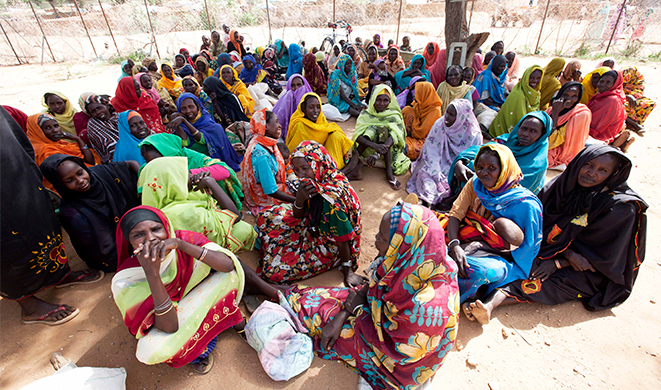
As the African Union prepares to reconvene talks between the Sudanese Government and rebel leaders, the stakes for peace and for civilians affected by the conflict are higher than ever. February 2014 was the deadliest month for civilians in South Kordofan due to aerial bombardment since 2011. In Darfur, a brutal surge of state-sponsored violence has led to the displacement of 215,000 individuals in the first three months alone. Efforts to deal with these recent challenges have been fragmented in their responses with key actors being left out of negotiations and the absence of a holistic negotiation strategy leaves the changes for real and substantial peace slim. Both the A.U. Peace and Security Council (AUPSC) and the Commission’s Chairperson, Nkosazana Dlamini Zuma have “publicly recognized the need for a more holistic strategy to address Sudan’s wars.” Additionally, in a monumental move, Chairperson Zuma has met with rebels in the Darfur region to discuss their ideas for peace talks.
A new Enough Project report, “Sudan’s Tortured Peace Process”, discusses the current interconnected nature of the conflict and urges African Union and American diplomats to push for approaches and frameworks that recognize all stakeholders and interests of all parties. A comprehensive approach can transform the political landscape of Sudan and work to bring the peace that the Sudanese people need.
The authors of the report argue that the current nature of peace process in Sudan are too segmented with ineffective frameworks for both Darfur and the conflict in South Kordofan/Blue Nile. Without addressing the conflict holistically, the separate frameworks fail to recognize the interconnected nature of the active conflicts and the current state of the rebel coalition. When one peace agreement fails to promote consistent peace in a region, fighting can be intensified in the other areas making it almost impossible to address and sustain peace in the current zones of conflict as the peace processes stand now. Rebel leaders hope to address peace on a broader scale, but face resistance from the Sudanese government and African Union mediators. While many groups ranging from civil society organizations to AU and EU official have supported the idea of a comprehensive and unified peace process, there has been little international effort to actively push for this type of solution using a variety of diplomatic measures. In order to address and stem the worsening violence in these areas that have displaced hundreds of thousands of civilians, the need to push for a comprehensive process is critical.
Akshaya Kumar, Enough Project Sudan and South Sudan Analyst and co-author of the report says,
“A divided peace process mounts especially high stakes for civilians living in Sudan’s conflict-affected areas. This year’s rainy season is beginning early, putting millions at risk of food insecurity. An estimated four million in Sudan now face “emergency level” insecurity.”
The report makes four recommendations for external actors to help advance the peace process effectively. First, African Union mediators should unify some of the piecemeal agreements and work towards developing a comprehensive peace process that addresses the conflicts and involves the parties in Darfur, South Kordofan, Blue Nile, and eastern Sudan. The U.S. should end all support for the DOHA agreement and the AUHIP initiative focusing on Blue Nile and South Kordofan, stressing the need for a single agreement that encompasses all of the conflicts. Additionally, the U.S. should increase its diplomatic efforts pushing for an international coalition to push for this peace process as well as deploying a separate U.S. envoy to focus on issues in Sudan as the current envoy is working on the outbreak of violence in South Sudan. The U.S. Congress should pass a measure to allow support for capacity building for the armed opposition as it transforms itself into a political entity and increase support to civil society actors. Finally, the U.S. should take the lead of developing incentives and pressures that could be leveraged to push for such a comprehensive peace process with targeted sanctions on gold traders and statements about debt relief being examples.
Read or download the full report.
Photo: Women wait for food rations from WFP in Kaasab camp, Darfur, Sudan. (AP)

